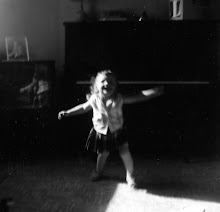One friend talked about the "goodbye" factor -- people want to visit a sick person to say goodbye. She compared this to her own experience of sending her son off to Afghanistan; should she have a gathering to mark his departure, and if so, would people be coming to say goodbye to him -- not see-you-later goodbye, but maybe-you-won't-come-back goodbye?
Someone else said that my desire to turn away visitors and be on my own for a while made her feel less guilty about not having spent enough time, in her mind, with her mother while she was dying. As I mentioned, the compulsion to be with the dying person 24/7 is natural, and often necessary, but ignores the fact that an adult can be alone with themselves for at least some part of the day, and may want to, depending on the person and the extent of the illness.
I have got a ton of things done in the past 10 days while my mother cleaned and cooked and waited on me like a butler. The taxes are finished (I'm getting a refund!), the trip out west is almost fully booked, a bunch of paperwork and phone calls have been completed, but I still have much estate planning to do, including visits with my lawyer and my financial advisor and my family. Dying is a lot of work.
Meanwhile, my friend Hugh sent me this article that made me hopeful about how much time I have left; clearly the doctor is just guessing about my prognosis, and one simply never knows. I have been eating everything under the sun lately, theorizing that at this stage eating healthy is a waste of my time and that gorging on chocolate and sour cream and butter and all manner of prepared convenience foods is satisfying to my soul, a key factor in sustaining my mood. But another part of me says I could extend my life if I were more rigorous about my diet. There are researchers who swear that eating dairy and sugar simply feeds cancer, but I can never bring myself to trust them. Depriving myself at this stage seems crazy. But I think drinking milk, for example, is exacerbating this phlegm problem, which seems connected to the paralyzed vocal cord and my difficulty swallowing. I'm really hoping that I can finally sustain the required treatment pretty soon; five months of this hoarse voice and choking fits has been hell.
How do I feel? Walking is difficult; I had two semi-falls in the past two days, partly because I trip over my semi-paralyzed feet quite easily. My forehead is peeling from the skin burn that seems to have arisen because I went out in a convertible with the top down on a sunny day without sunscreen right after having my head radiated. My face is still red and fat from steroids (and the brownies and apple turnovers), and my scalp is completely shaved with a little stubble. Very stylish. I'm still deaf in one ear, and talking is a struggle. In a crowded place with a lot of ambient noise, especially if someone is pushing my wheelchair and I'm facing away from them, I feel like I'm in an isolation bubble -- can't hear, can't make myself heard. When I stand up, I feel like my legs are made of ice. It's kind of what I imagine it would feel like if one had hypothermia. What makes it worse is the vertigo: the feeling that I'm swaying and on some really powerful sedative.
But I'm still managing with the walker and still getting down to the basement for showers and still getting in and out of the house, and that's what matters for now.
Pollyanna moments:
- Some amazing tropical flowers from Scott in a big planter, and pussy willows and tulips and orchids from others.
- Diane took mom and me shopping at Winners and I finally bought some pants that kind of fit me now that I've lost weight (except my belly is so distended on top of my vanishing legs that nothing really fits properly). Then mom and I managed to get me up to my bedroom (not without a fall that bruised my hip nicely), where I tried on tons of clothes that I haven't been able to get done up for years. It's like acquiring a whole new wardrobe. I always called them my breast cancer recurrence clothes, and I'm determined to go out looking well-dressed.
- Have booked Mom, Joan and me into some swanky hotels in Vancouver, Victoria and Gabriola Island, and plan to book our flights today. Please, please let me feel well enough to go on April 25.
- I can hear birds outside my window.
- Matt arrives from Red Deer tomorrow!







